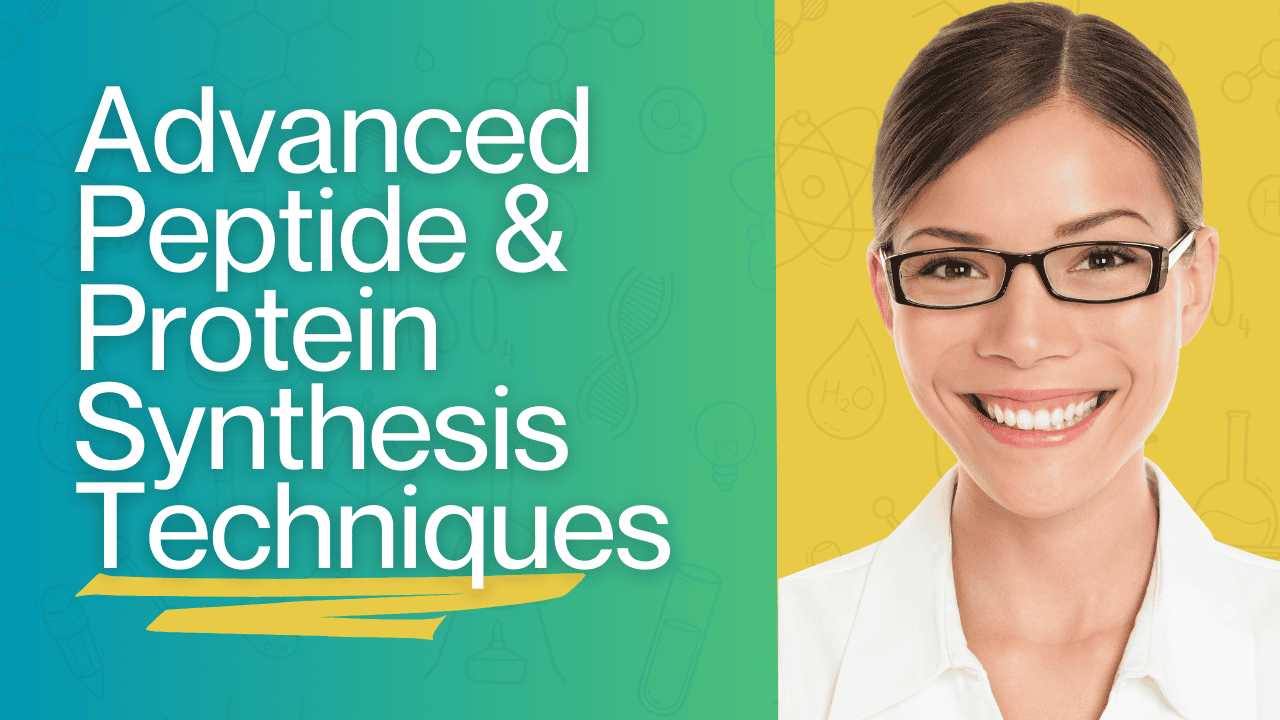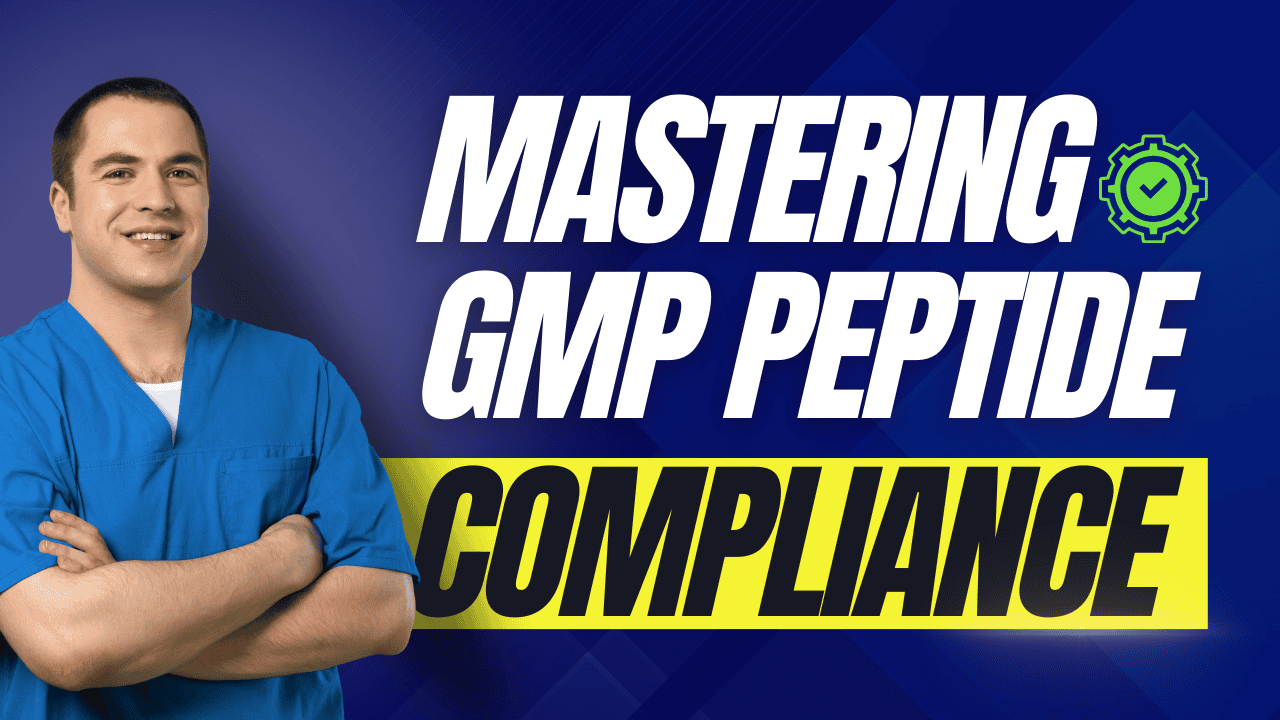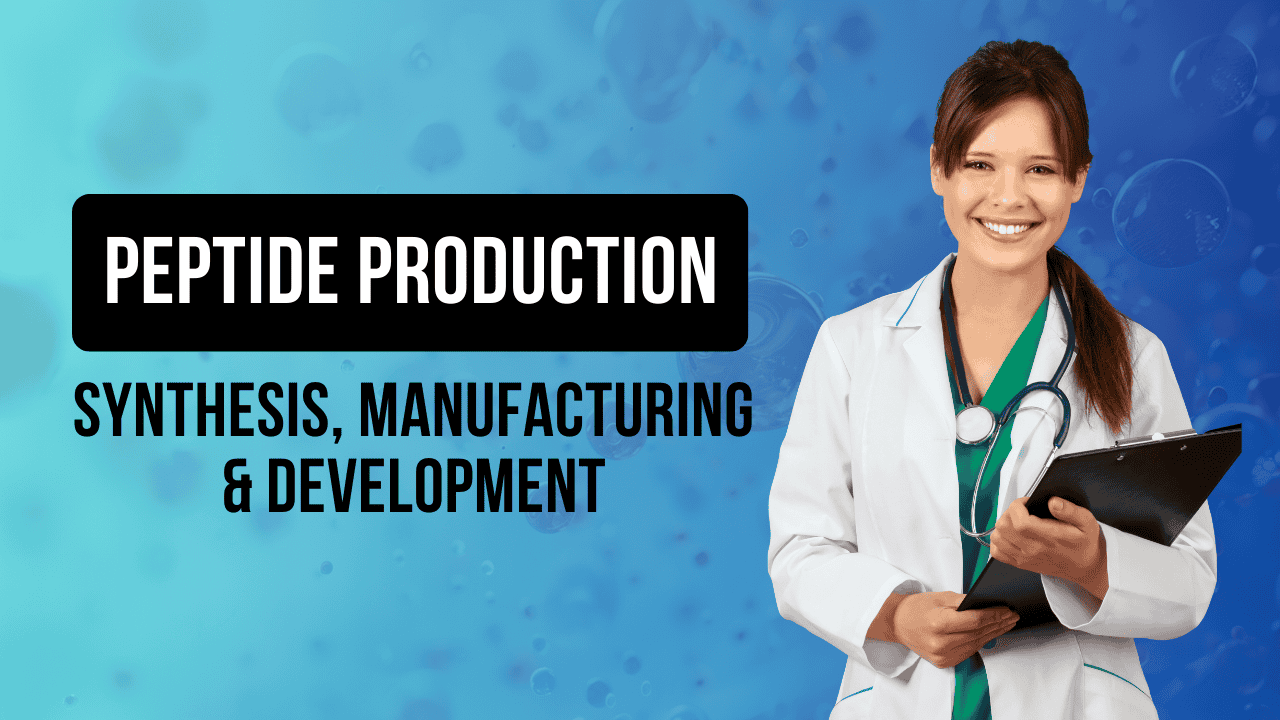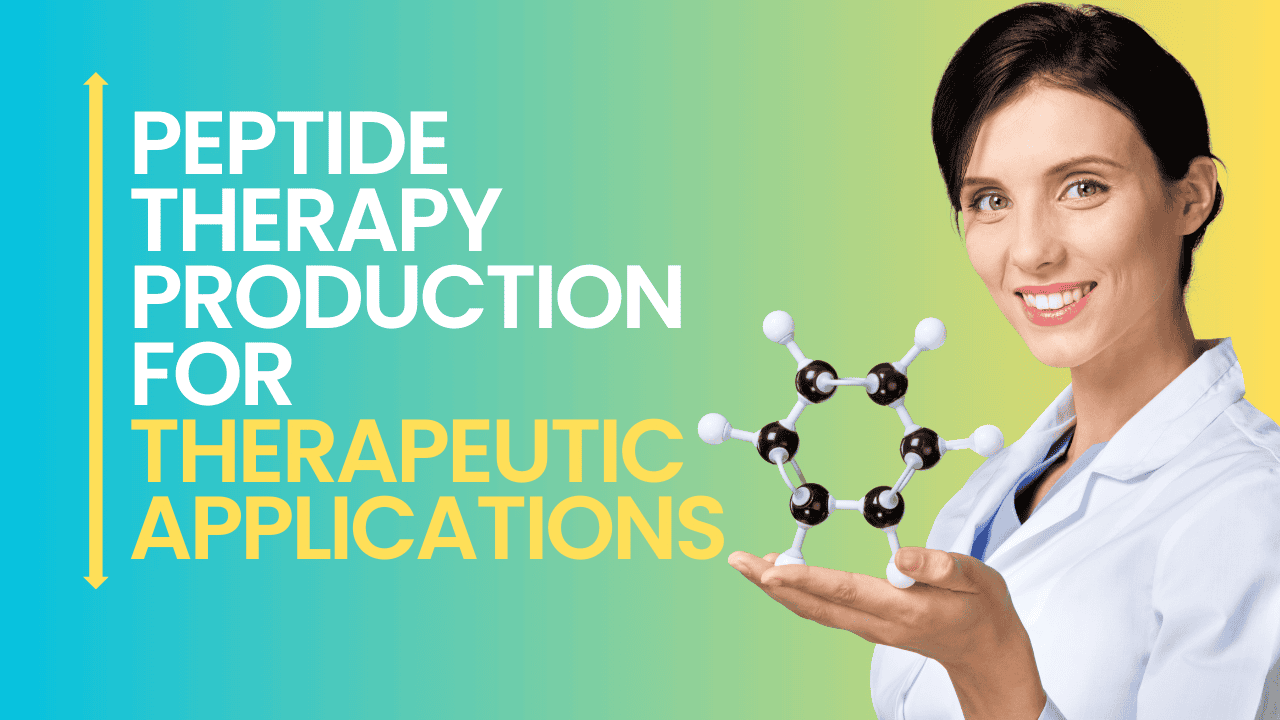

This article delves deep into the realm of mastering GMP peptide compliance.
Explore the comprehensive guide to understanding GMP for peptide production, quality control, and ensuring the safety and effectiveness of peptides.
From personal anecdotes to hypothetical scenarios, this read is worth your time for a fascinating blend of technical know-how and engaging storytelling.
GMP stands for Good Manufacturing Practice, a system ensuring products are consistently produced and controlled across manufacturing processes. Think of it as a safety net, constantly catching any potential missteps to keep peptide production on the straight and narrow.
When it comes to peptide synthesis, GMP compliance is your golden ticket. By adhering to GMP standards, you ensure that every peptide product is not just safe but also effective. Imagine cooking without a recipe—that’s like trying to manufacture peptides without GMP regulations. The outcome? Unpredictable and potentially disastrous.
GMP regulations put a magnifying glass on every step of peptide synthesis. They dictate the purity of reagents, the cleanliness of equipment, and the overall quality control procedures. It’s akin to having an overzealous parent watching your every move, ensuring you do your homework correctly.
Key GMP guidelines for peptides include strict control of sourcing high-quality amino acid derivatives, thorough documentation for each step, and rigorous quality checks. Regulatory agencies like the FDA scrutinize these processes to ensure compliance.
GMP principles for peptides revolve around safety, efficacy, and reproducibility. It’s all about making sure each peptide batch is like a finely-tuned orchestra, every note in perfect harmony.
To achieve GMP compliance, the peptide APIs must undergo stringent validation and in-process controls. Document everything meticulously and keep those batch records spotless. It’s like preparing for a major audit where every detail matters.
CGMP, or Current Good Manufacturing Practice, plays a pivotal role in modern peptide manufacturing. CGMP ensures that every aspect, from peptide synthesis to the final product, meets the highest standards.
The difference between GMP and non-GMP peptide production is like night and day. GMP peptide production involves strict adherence to regulatory standards, while non-GMP lacks these rigorous controls, potentially compromising the peptide’s purity and efficacy.
GMP peptide synthesis involves several meticulous steps, starting from the selection of high-quality reagents, the actual synthesis (often via solid phase peptide synthesis), and stringent purification. Each step must meet GMP standards to produce high-quality peptides.
In GMP settings, solid phase peptide synthesis (SPPS) is performed with immaculate precision. Every solvent, resin, and amino acid derivative must meet GMP quality standards to ensure the final peptide’s efficacy and purity.
GMP peptide production is challenging due to the need for precise control over every variable. From maintaining consistent temperatures to ensuring no cross-contamination, it’s a high-wire act where the stakes are uncomfortably high.
Quality Control (QC) in GMP peptide production involves stringent testing at every stage to ensure the product’s integrity, purity, and consistency. Think of QC as the ultimate guardian, ever vigilant in its duty.
Quality control in GMP peptide manufacturing is ensured through constant analytical testing, such as HPLC and amino acid analysis. No stone remains unturned to validate the peptide’s quality.
Techniques like HPLC and advanced purification methods are critical for GMP compliance. These techniques ensure the purity of the peptide, eliminating any potential contaminants.
GMP standards ensure the safety of peptide APIs through rigorous process validations and in-process controls. Stability testing is crucial to ensure the peptide remains effective until it reaches its final destination.
Key safety tests in GMP peptide production include microbial testing, endotoxin testing, and product stability studies. These tests help ensure the peptide’s safety for clinical use.
Stability testing involves subjecting the peptide API to various conditions to ensure it maintains its effectiveness and safety. It’s like a stress test for peptides, ensuring they can withstand real-world conditions.
Peptide purification methods include HPLC, size-exclusion chromatography, and ion-exchange chromatography. Each method is chosen based on the specific requirements of the peptide being produced.
Purification is critical for ensuring GMP peptide quality. It removes impurities and ensures the final product’s purity, making it safe and effective for pharmaceutical use.
Best practices for GMP peptide purification involve using high-quality solvents and reagents, ensuring equipment cleanliness, and adhering to validated processes. AmbioPharm, for example, sets a high bar in ensuring the purification process meets GMP standards.
Critical steps in GMP peptide synthesis include selecting top-notch amino acid derivatives, using validated processes, and ensuring every step meets stringent GMP guidelines. Each step is a building block towards creating a high-quality peptide.
Optimizing peptide synthesis for GMP compliance involves streamlining processes, rigorous documentation, and continuous monitoring. Every detail is crucial, much like ensuring every piece of a puzzle fits perfectly.
Solid phase peptide synthesis (SPPS) under GMP regulations requires meticulous attention to detail. The resin, reagents, and amino acids used must comply with GMP standards to ensure the final product’s quality and purity.
API manufacturing for peptides involves producing the active pharmaceutical ingredient (API) under strict GMP conditions. This ensures that the peptide API is of the highest quality and purity.
To ensure GMP compliance in peptide API manufacturing, maintain rigorous documentation, validate processes, and adhere to strict quality control measures. It’s like following a precise recipe to bake the perfect cake.
Best practices for GMP peptide API production include using high-quality reagents, maintaining clean manufacturing facilities, and adhering to validated processes to ensure the final product’s quality and reliability.
The GMP peptide production process entails everything from selecting high-quality starting materials to final quality checks. Each step is carefully monitored to ensure compliance with GMP standards.
Managing the peptide production process under GMP involves thorough documentation, continuous monitoring, and adherence to strict protocols. It’s a delicate balancing act, ensuring each step meets GMP criteria.
Key steps in CGMP peptide production include solid phase peptide synthesis, purification, quality control, and stability testing. Each step must comply with current GMP standards to ensure the final product’s efficacy and safety.
Regulatory bodies, such as the FDA, influence GMP peptide compliance by setting stringent guidelines and conducting inspections. Their role is akin to a vigilant guardian, ensuring every peptide production process is above board.
Regulatory requirements for GMP peptide production include thorough documentation, validation of processes, and strict quality control measures. Compliance with GMP standards is non-negotiable.
Staying updated with GMP regulations for peptides involves regular training, subscribing to industry updates, and continuously reviewing regulatory guidelines. It’s like keeping up with the latest trends in fashion but far more critical.
The transition from small molecule to peptide in GMP involves scaling up from simple molecular structures to more complex peptides. This process requires meticulous planning and adherence to GMP standards.
GMP affects every stage of peptide manufacturing, from initial amino acid synthesis to final product packaging. Each step must adhere to strict GMP guidelines to ensure product quality and safety.
Scaling up GMP peptide manufacturing presents challenges like maintaining consistency, ensuring purity, and adhering to regulatory standards. It’s like moving from baking cupcakes to running a full-fledged bakery.
Common challenges in GMP peptide compliance include maintaining documentation accuracy, ensuring consistent quality, and navigating regulatory changes. These challenges require constant vigilance and adaptation.
Overcoming GMP compliance challenges involves rigorous training, continuous monitoring, and investing in advanced technologies. Think of it as assembling a team of superheroes, each with their unique power to tackle every challenge.
Solutions for ensuring GMP compliance in peptide synthesis include adopting automated systems, continuous process validation, and regular audits. It’s like having a well-oiled machine, running smoothly and efficiently.
Emerging trends in GMP peptide manufacturing include automation, use of environmentally friendly solvents, and advanced purification techniques. These trends aim to enhance efficiency and compliance.
GMP peptide production will likely embrace more automation, stricter regulations, and innovative technologies to ensure higher purity and efficiency. The future looks bright and promising.
Innovations like advanced chromatography techniques, real-time monitoring, and AI-driven process optimization are shaping the future of GMP peptide production. These innovations promise to revolutionize the industry.
AmbioPharm is a leading company in GMP peptide manufacturing, known for its stringent adherence to GMP standards and innovative processes. They set the benchmark for quality in the industry.
From AmbioPharm’s approach to GMP compliance, we learn the importance of rigorous documentation, continuous process validation, and embracing innovative technologies. They are a shining example of excellence in peptide manufacturing.
AmbioPharm ensures GMP standards in peptide API production by employing advanced purification techniques, maintaining cleanroom facilities, and adhering to strict quality control protocols. They leave no stone unturned in their quest for excellence.
Strategies for continuous GMP compliance include ongoing training, regular audits, and continuous process improvements. It’s a never-ending journey toward excellence.
Monitoring compliance in GMP peptide production involves constant vigilance, regular inspections, and utilizing advanced monitoring tools. It’s like having a watchdog, ever-alert and ready to pounce on any deviations.
Tools and technologies like automated monitoring systems, advanced analytical techniques, and robust documentation software are essential for maintaining GMP compliance. These tools ensure the process remains smooth and compliant.
The final peptide product is verified for GMP compliance through rigorous testing, including HPLC, stability studies, and thorough documentation review. It’s the final checkpoint before the peptide is deemed ready for use.
Testing for the final GMP peptide product includes microbial testing, endotoxin screening, and purity analysis. These tests ensure the product meets all GMP standards and is safe for use.
GMP influences the packaging and distribution of peptides by requiring strict controls to ensure no contamination and maintaining the product’s integrity. Every step from production to the final packaging is meticulously monitored.
GMP profoundly affects peptide drug development by ensuring the processes involved are safe, effective, and reproducible. It’s the backbone that supports the entire development pipeline.
Key GMP considerations for peptide drugs include purity, stability, and consistent quality. Ensuring these factors requires strict adherence to GMP guidelines throughout the development process.
Ensuring GMP compliance in peptide drug formulation involves rigorous testing, continuous monitoring, and thorough documentation. Think of it as constructing a skyscraper, where every beam must be perfectly aligned.
Stability testing in GMP peptide production ensures that the peptide remains effective and safe throughout its shelf life. It’s like a long-term relationship test for peptides, ensuring they stay strong and stable over time.
Performing stability testing under GMP regulations involves subjecting the peptide to various conditions and monitoring its stability and potency. This testing helps ensure the product remains effective throughout its intended use period.
Stability testing requirements for GMP peptide products include testing under different temperatures, humidity levels, and light conditions. The goal is to ensure the peptide maintains its integrity and effectiveness throughout its shelf life.
By embracing GMP compliance, the peptide industry can continue to innovate while maintaining the highest standards of safety and efficacy.
The manufacturing process of peptides typically involves solid-phase peptide synthesis (SPPS) or liquid-phase peptide synthesis (LPPS). In SPPS, peptides are synthesized step-by-step on a solid resin, facilitating the production of high-quality peptides. The process includes sequence assembly, cleavage and deprotection, and purification. During process development, each stage is optimized to ensure the final drug product meets stringent quality standards.
Yes, peptides are regulated by the FDA (Food and Drug Administration). The FDA ensures that peptide-based drugs meet specific safety and efficacy standards before they reach the market. Agencies such as the FDA enforce guidelines that manufacturers must adhere to, ensuring the peptide drugs are safe for clinical trials and commercial production.
Quality control of peptides involves rigorous testing throughout the manufacturing process to ensure purity and consistency. This includes in-process monitoring, final product testing using HPLC methods, and stability as well as clinical studies. Quality assurance teams validate these methods to ensure the peptide content meets regulatory standards. QC helps maintain the integrity and efficacy of the peptide.
Common impurities in peptides may include peptide fragments, incomplete sequences, and residual solvents. These impurities can arise during the chemical synthesis or purification process. Ensuring high purity is crucial to meet regulatory requirements and to ensure the safety and effectiveness of the final product.
Common impurities in peptide synthesis include amino acid byproducts, incomplete peptide chains, and contaminants from reagents. Solid-phase peptide synthesis often results in these unwanted products, emphasizing the need for meticulous purification processes. Ensuring GMP compliance helps in reducing such impurities.
Contaminants of peptides can include microbial contamination, residual solvents, and heavy metals. These contaminants might get introduced during the manufacturing of peptides or through environmental exposure. Implementing stringent process controls and quality assurance measures helps in identifying and mitigating these contaminants.
Peptides are typically purified using high-performance liquid chromatography (HPLC) and ion-exchange chromatography. These methods help in separating the peptide from impurities and ensuring high purity. The purified peptides then undergo stability testing to ensure their efficacy and safety for clinical trials.
Residues in peptides refer to the individual amino acid residues that make up the peptide chain. Each residue corresponds to an amino acid linked by peptide bonds, forming the primary structure of the peptide. Proper sequencing during synthesis ensures the correct arrangement of these residues.
Polypeptides are manufactured using techniques like solid-phase synthesis and liquid-phase synthesis. These methods involve the step-by-step addition of amino acid residues to create longer peptide chains. The process may include cleavage and deprotection steps to finalize the polypeptide. Scale production ensures sufficient quantities for research or commercial use.
The process of peptide synthesis can be performed using solid-phase or liquid-phase methods. Solid-phase peptide synthesis (SPPS) involves building the peptide chain on a solid resin support. Each amino acid is added sequentially, followed by deprotection and purification steps. This method is widely used due to its efficiency and ability to produce high-quality synthetic peptides.
Dr. Fernando Albericio is a highly esteemed figure in the field of peptide synthesis and drug development, with over 30 years of experience. Specializing in the design and synthesis of complex peptides and peptidomimetics, Dr. Albericio has significantly contributed to advancements in pharmaceutical applications of peptides. His extensive research has influenced how peptides are synthesized, particularly focusing on improving the efficiency and purity of the peptides.
Dr. Albericio’s notable publications include:
Dr. Albericio has received numerous awards for his contributions, including the RSEQ Awards in Chemical Research and Blasco Award for Research Excellence. His work’s depth and impact highlight his authority and trustworthiness in the peptide synthesis and pharmaceutical fields.
Dr. Jean Martinez is a leading researcher with expertise in peptide science and a particular focus on peptide-based drug development and cancer therapeutics. With a background in biochemistry and over 25 years of research experience, Dr. Martinez has been instrumental in advancing our understanding and utilization of peptides in treating various diseases. His collaborative approach to research has led to numerous groundbreaking studies in the field.
Key publications by Dr. Martinez include:
Dr. Martinez’s work is characterized by its innovative and rigorous approach, earning him numerous accolades, including the Grand Prix de la Recherche de l’AP-HP and the prestigious IUPAC 2019 Award. His commitment to improving peptide-based therapies underscores his expertise and reliability in the field, making him a trusted authority in peptide research and development.
Abou, D. S., Zerkel, P., Robben, J., McLaughlin, M., Hazlehurst, T., Morse, D., Wadas, T. J., Pandya, D. N., Oyama, R., Gaehle, G., Nickels, M. L., & Thorek, D. L. (2022). Radiopharmaceutical quality control considerations for Accelerator-Produced actinium therapies. Cancer Biotherapy and Radiopharmaceuticals, 37(5), 355–363. https://doi.org/10.1089/cbr.2022.0010
Matsuda, Y., Clancy, C., Tawfiq, Z., Robles, V., & Mendelsohn, B. A. (2019). Good Manufacturing Practice Strategy for Antibody–Drug Conjugate Synthesis using Site-Specific Chemical Conjugation: First-Generation AJICAP. ACS Omega, 4(24), 20564–20570. https://doi.org/10.1021/acsomega.9b02419
Sigalet, D. L., Brindle, M., Boctor, D., Casey, L., Dicken, B., Butterworth, S., Lam, V., Karnik, V., De Heuvel, E., Hartmann, B., & Holst, J. (2015). Safety and dosing study of Glucagon‐Like peptide 2 in children with intestinal Failure. Journal of Parenteral and Enteral Nutrition, 41(5), 844–852. https://doi.org/10.1177/0148607115609566
Wallrapp, C., Thoenes, E., Thürmer, F., Jork, A., Kassem, M., & Geigle, P. (2012). Cell-based delivery of glucagon-like peptide-1 using encapsulated mesenchymal stem cells. Journal of Microencapsulation, 30(4), 315–324. https://doi.org/10.3109/02652048.2012.726281
Wang, X., Urak, R., Walter, M., Guan, M., Han, T., Vyas, V., Chien, S., Gittins, B., Clark, M. C., Mokhtari, S., Cardoso, A., Diamond, D. J., Zaia, J., Forman, S. J., & Nakamura, R. (2022). Large-scale manufacturing and characterization of CMV-CD19CAR T cells. Journal for ImmunoTherapy of Cancer, 10(1), e003461. https://doi.org/10.1136/jitc-2021-003461
ALL ARTICLES AND PRODUCT INFORMATION PROVIDED ON THIS WEBSITE ARE FOR INFORMATIONAL AND EDUCATIONAL PURPOSES ONLY. The products offered on this website are intended solely for research and laboratory use. These products are not intended for human or animal consumption. They are not medicines or drugs and have not been evaluated or approved by the FDA to diagnose, treat, cure, or prevent any disease or medical condition. Any form of bodily introduction is strictly prohibited by law.



Discount Applied Successfully!
Your savings have been added to the cart.